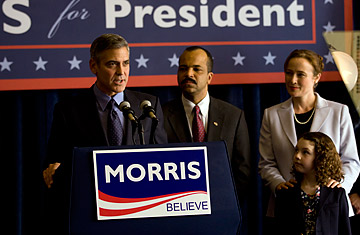
Clooney’s Political Film.
George Clooney’s political movie, The Ides of March, is a provocative tale of political ethics, loyalty, and bare-knuckle battles for personal gain. It’s also a timely commentary that reminds of the 2008 Democratic presidential campaign. Set in Ohio before an intense mid-March primary election, the film provides an intense look at behind-the-scenes jockeying that keeps theatergoers analyzing and anticipating.
Ohio has become a hotspot in presidential politics and it plays out in this film, “As goes Ohio, so goes the nation.” Cincinnatians will spot familiar Queen City landmarks and nostalgia—Bearcats, the Roebling Bridge, and the X on the floor of the Cintas Center.
The film opens with its main character, press secretary Stephen Myers (Ryan Gosling), standing on a college stage doing sound checks to prepare for his candidate, Governor Mike Morris (George Clooney). Who is Morris? He’s an avowed liberal, admitted atheist, and antiwar candidate. He’s part Obama, reflected by his campaign posters. We later find he’s part Bill Clinton. He’s in a tough battle for the Democratic nomination against Senator Pullman, who touts his electability in November.
Clooney, also director, based the film on the play Farragut North. The 2008 play, written by Beau Willimon, an aide to both Senator Chuck Schumer (D_NY) and Howard Dean, has likely seen his fair share of backroom intraparty intrigue. Clooney’s screen version plays to several themes that have become mainstays in national campaigns for the party nod. The Morris camp has to consider how playing to his party’s base will be packaged as extremism during the general campaign. High profile endorsements and convention delegations are sought in return for post-election appointments. And, of course, there’s sex.
The narrative hook comes when Myers, “the best media mind in the country,” receives a call from Pullman campaign manager Tom Duffey (Paul Giamatti), asking for a brief, secret meeting, which immediately tests Myers’s conscience. Reluctantly, Myers shows up for a beer and the sensitive information he cannot resist. After revealing some of their own internal polling, campaign strategy, and inevitable victory, Duffey tries to entice Myers to leave Morris’s campaign to come work for Pullman. Myers resists, placing loyalty to his friend over the promise of future political success. “Do you want to work for a friend or for the president?” Duffey presses.
Elements of the 2008 Democratic campaign become obvious. When Duffey tempts Myers, he declares that Ohio has an open primary. “Every conservative is going to line up and punch my guy’s ticket,” says Duffey, citing how “Limbaugh and Hannity” are trying to influence the Democratic contest. Recall as Super Tuesday 2008 approached, Rush Limbaugh encouraged Ohio Republicans to go to the polls and vote for Hillary Clinton on a Democratic ballot in order to prolong her fight with Obama and to increase the chances for the more divisive, perhaps less-electable, Clinton. When Hillary won the Ohio primary, to no one’s surprise, Limbaugh undeservingly claimed the credit. The Ohio secretary of state later found that 7.5 percent of Democratic voters had voted Republican before. FactCheck.org estimated through exit polls that about half voted for Obama and the other half voted for Clinton.
Mrs. Clinton had appeared at Cincinnati State with then-Governor Ted Strickland as the Ohio contest heated up. In Game Change, the most comprehensive behind-the-scenes tale of 2008, authors John Heilemann and Mark Halperin suggest that Strickland was atop Hillary’s VP shortlist in hopes of steering Ohio’s Democratic electorate and convention delegates her way. In Ides, a similar endorsement plays into the race.
The plot thickens when a cute young female intern in the Morris camp gets overly friendly. Without revealing too much here, let’s just say John Edwards’s real-life affair with campaign filmmaker Reille Hunter, their love child, and cover up had to be considered in this script. When Ryan Gosling’s character makes a shocking discovery, he throws damage control into high gear. One must wonder how much Andrew Young, an Edwards disciple, serves as a model for the Myers character. Young became the key enabler for his friend and took the fall for a time as the father of Hunter’s child while his boss was still seeking the nomination. Others in the Edwards camp surely knew of the pregnancy and the real father. How should they have acted? For their candidate, for the party, or for the country? As the Edwards affair unfolded thanks to a tenacious National Enquirer, journalists and Democratic leaders became shocked that Edwards’s people withheld something that would have inevitably come out during the general election campaign and would likely have handed the presidency to nearly any GOP candidate.
From the early phone call and encounter between Duffey and Myers, ethics and behind the scenes intrigue keep the viewer on the edge of their seat. Aides in both camps and a high profile office-seeking North Carolina Senator play hardball. After a check-mate moment, Morris is pushed into making a tough decision. The question is: will Stephen Myers do the same?